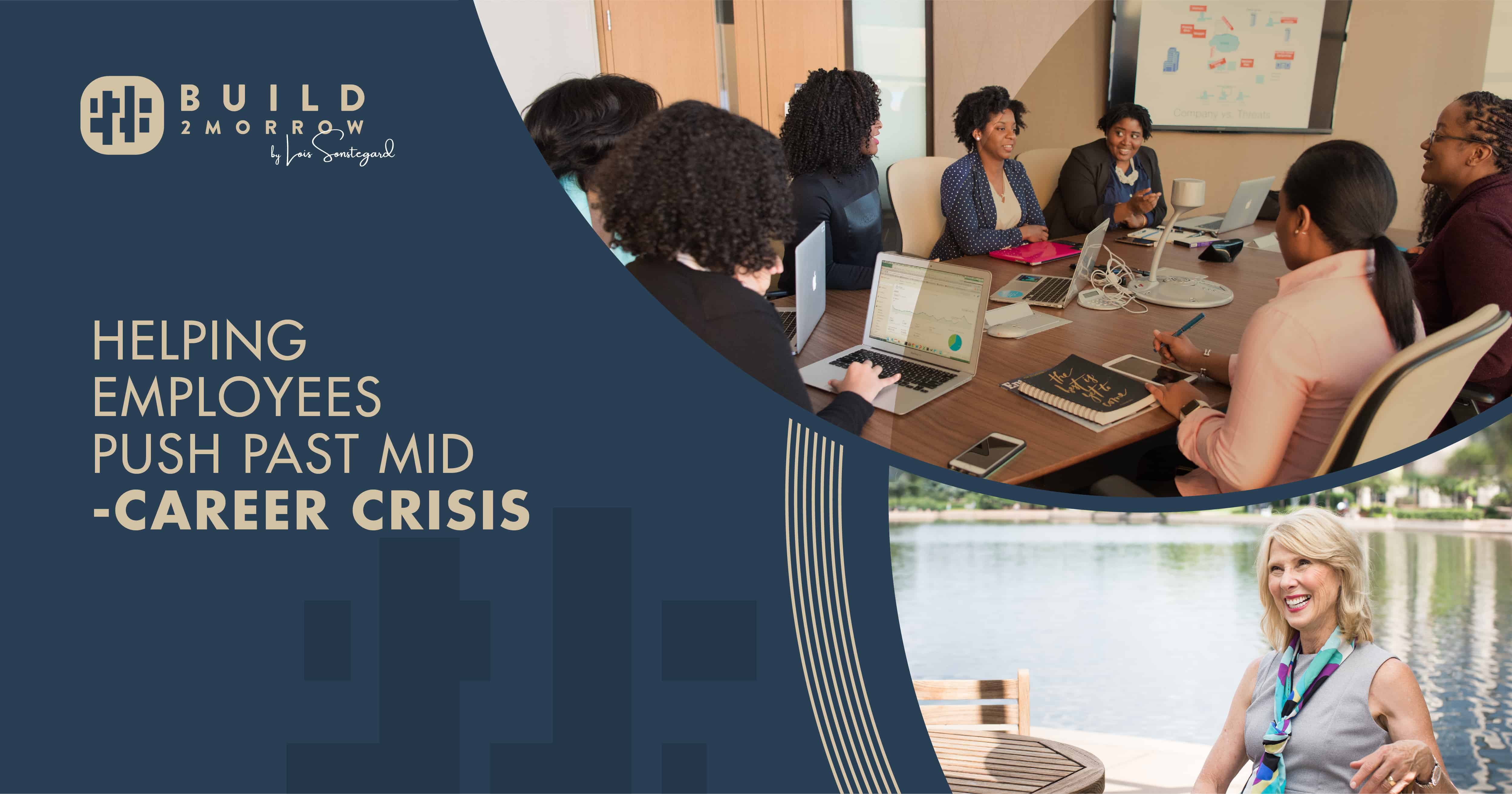Helping Employees Push Past a Mid-Career Crisis
Everyone knows about the “midlife crisis” — the emotional crisis of identity and self-confidence that can strike in middle age.
A similar event can occur in the middle of our careers. It’s an event many people feel but don’t articulate: a mid-career crisis.
As a manager, you typically pay more attention to employees either starting their jobs or those leaving them. Entry-level employees need more of your time and attention to ensure they learn everything their new role entails. Similarly, you need transition and succession plans in place for employees vacating their positions.
But what about the employees in the middle of their careers?
Mid-career employees are in danger of a mid-career crisis. Talented and skilled employees may feel they have no opportunities within their current company. As a result, their morale and productivity may decrease. They may become dissatisfied, disengaged and even vulnerable to offers from rival companies. Employees prove their importance to their companies over time. The skills they’ve learned and the experience they’ve gained make them invaluable to their organizations. Like many employees, they’ve told us they want to continue to grow and develop in their career.
That means there’s a real opportunity for managers and organizations to develop plans for mid-career employees. How do you guide them through this crisis and even cultivate their productivity to help them reach retirement?
Here are ways you can help your mid-career employees:
1. Provide lateral transfers or opportunities.
Mid-career employees who are happy with their level of responsibility but looking for intellectual stimulation, a change of pace or a change of scenery may be good candidates for a lateral transfer. New people, a different environment and a new office or department may help re-energize these employees.
Make the position change more enticing by giving the employee additional skill-building training or even an opportunity to “shadow” another employee to “test the waters.” Mid-career internships are a good idea, too.
If you can, consider creating a new role or division that uses the employee’s existing knowledge base and experience, but in a new and different way.
For many companies, social media represents the newest and biggest opportunity. If you need a social media manager and have thought about hiring externally or getting a newbie, consider a mid-career employee who can use of existing skills, experience and knowledge to engage customers in this new way.
2. Develop an internal mission for those needing a deeper sense of purpose
We spend the majority of our adult lives at work, diligently carving out careers and earning the money to provide comfortable lifestyles for ourselves and our families. Yet, like those in a midlife crisis, we begin to doubt ourselves and ask, “Why are we working so hard? What is all this for?”
For your mid-career employees who need a deeper sense of purpose, think about launching a philanthropic arm of your organization. You could create a partnership with a charity or even volunteer for pro bono work. Endeavors like these can help employees see a new value in their work.
Be sure to involve mid-career employees in the choice of charities and include volunteer work times in their schedules. The 1-1-1 model of giving is a good example of getting employees involved and showing your organization’s commitment, too. Employees volunteer 1% of their time and your organization pledges 1% of your profits and 1% of your products to support a local, national or international cause that employees feel strongly about.
3. Establish a mentorship program.
Here’s a “win-win-win” program for your organization, your seasoned employees and your new hires. A structured mentorship programs gives mid-career employees a greater sense of purpose while ensuring new employees gain the right skills, attitude and mindset they need.
As a manager, you identify employees who would be good role models to your “newbies” and who want more interaction with other employees in the company.
Be sure to build a two-way mentorship program. Mid-career employees should not only mentor those with less experience, but also have a chance to become mentees themselves – learning from higher-level managers or from their peers. It’s an excellent opportunity for mid-career employees to share their experience and knowledge and gain new knowledge at the same time.
4. Offer physical relocations.
Some mid-career employees may just need a change in scenery or location. A new location can give these employees fresh enthusiasm and increased engagement. Relocating employees can also help the company grow when the move matches your future goals. You have nothing to lose and everything to gain.
Don’t forget to give additional support to employees with spouses or families to help make the move and transition as smooth as possible.
5. Provide chances for remote work.
Workplace commutes can be stressful. Raising children is challenging. For mid-career employees who face these issues, the opportunity to work from home could be a big bonus. Being close to family, not having to make a long journey to and from work, and having the chance to be more involved in their children’s lives are great advantages for mid-career employees. They can take an online leadership training or continue their professional careers while also taking care of their personal lives.
New workers. Retiring workers. Mid-career workers. Their skills and experience are all valuable, and they all contribute to your organization’s success.
Now is the time to devote more attention to your employees in the middle of their careers. You’ll find it can improve their engagement, productivity and satisfaction. And it may help them push past a mid-career crisis so you keep these valuable resources within your organization and continue to benefit from their skill sets and experience.
https://hbr.org/2018/03/many-employees-have-a-mid-career-crisis-,heres-how-employers-can-help
Get in touch with us. Need help with a booking? Visit our bookings page;

